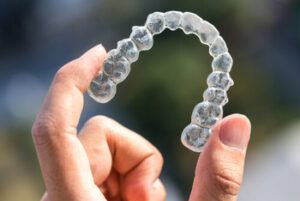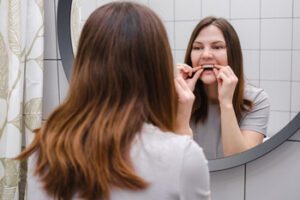In the orthodontic world, Invisalign has emerged as a popular teeth straightening treatment, lauded for its aesthetic appeal and convenience compared to traditional metal braces. However, patients often have lifestyle-related queries, the most common being: Can you smoke with Invisalign? This question is pertinent and highlights the intersection of oral health habits and orthodontic procedures.
The Basics of Invisalign Treatment
Customised Treatment Planning
Invisalign treatment begins with a thorough consultation, during which your dentist takes precise digital scans of your mouth. These scans are used to craft a 3D model of your teeth, allowing the dentist to plan your treatment in detail. The unique aspect of Invisalign lies in proprietary software that predicts the movements of your teeth at each stage of the treatment, providing a visual roadmap and timeline for your expected results.
Fabrication of Aligners
Based on the treatment plan, a series of custom-made aligners is produced specifically for your dental structure. These aligners are curated from patented thermoplastic material designed for optimal comfort and effectiveness. Each Invisalign tray is precisely trimmed to ensure it fits your gum line comfortably and is virtually invisible when worn.
Progression Through Aligners
The treatment involves wearing each set of aligners for about one to two weeks before moving on to the next in the series. Each aligner is slightly different, adjusting your teeth progressively towards their final position. Based on your unique treatment plan, the aligners are designed to exert the right amount of force in the right place at the right time.
Wearing and Maintenance of Aligners
For the best results, Invisalign aligners should be worn for 20 to 22 hours daily, only being removed for eating, drinking anything other than water, and brushing and flossing your teeth. This disciplined approach ensures that your treatment progresses as planned. Cleaning the aligners is straightforward—rinsing them under lukewarm water and brushing them softly with a toothbrush will keep them clear and free from debris.
Duration of Treatment
The duration of Invisalign treatment can vary depending on the case’s complexity and how well the patient sticks to wearing the aligners as recommended. Typically, treatment lasts 6 to 18 months, though many patients begin to see results in a matter of weeks.
Follow-Up Appointments
Regular appointments with your dentist are an essential part of the Invisalign process. During these visits, your dentist will examine your progress and make any necessary adjustments to your treatment plan. These check-ups are also an opportunity to receive your next set of aligners and ensure that everything is progressing as expected.
End of Treatment and Retention
Once the active phase of the treatment is complete, retaining your new smile is crucial. Retainers are often used post-treatment to ensure teeth remain in their new positions. Your dentist will advise you on how long to wear your retainer and whether it will be worn full-time or only at night.
Understanding these basics of Invisalign treatment illuminates the innovative nature of this orthodontic methbod and the commitments required from patients. With its custom-fit aligners and precise, staged approach, Invisalign offers a modern solution for achieving a straighter, healthier smile without traditional braces’ visual and physical burdens.
The Impact of Smoking on Dental Health and Invisalign
Smoking is well-documented for its adverse effects on general health, particularly lung and heart diseases. However, its impact on oral health is equally significant. Smoking can cause a variety of dental health issues, including gum disease, tooth decay, tooth discolouration, and even oral cancer. When discussing whether you can smoke with Invisalign, it’s essential to consider these risks.
Tooth Discoloration and Staining
One of the immediate effects of smoking while wearing Invisalign aligners is the potential for tooth discolouration. The nicotine and tar in cigarettes can tarnish not just your teeth, but also the Invisalign trays themselves, diminishing the invisibility feature that many find appealing.
Increased Risk of Gum Disease
Smoking affects blood flow, reducing oxygen and nutrient supply to the gum tissues, thereby increasing the risk of gum disease. Wearing aligners while smoking can exacerbate these conditions, as the aligners may trap harmful substances against the teeth and gums, intensifying the effects.
Compromised Effectiveness of Invisalign Treatment
The heat from cigarette smoke can warp Invisalign aligners, affecting their fit. An improper fit can drastically reduce the efficacy of the treatment, leading to extended treatment times or unsatisfactory results.
Combining Smoking and Invisalign: A Practical Perspective
Oral Health Care Recommendations During Invisalign Treatment
Maintaining excellent oral health is a cornerstone of successful Invisalign treatment. The challenges of keeping the teeth and gums healthy for individuals using clear aligners are unique but manageable with the right care strategies. Here are more detailed oral health care recommendations to optimise your treatment outcomes:
Professional Teeth Cleaning
Consistent dental check-ups and professional teeth cleanings are crucial during Invisalign treatment. These appointments help prevent the accumulation of plaque and tartar, which are primary contributors to tooth decay. Professional cleanings can also help prevent the staining of your teeth and Invisalign trays, ensuring that both remain pristine throughout the treatment.
Enhanced Daily Oral Hygiene
Maintaining rigorous oral hygiene practices while undergoing treatment with Invisalign is vital. This includes brushing your teeth in detail at least twice a day and flossing daily. Using a high-quality toothbrush and fluoride toothpaste will help decrease the danger of tooth decay and gum disease. Additionally, cleaning your Invisalign tray as your dentist recommends is essential to prevent bacterial build-up and odour.
Quitting Smoking
Quitting smoking is one of the most impactful steps to enhance your dental health, especially when undergoing orthodontic treatment with Invisalign. Smoking can accelerate the tooth decay process and increase the danger of gum disease, which can severely impact the success of your Invisalign treatment. Resources for quitting smoking are widely available, and your healthcare provider can offer support and prescribe treatments to help you quit. Addressing this habit is not only beneficial for your dental health but also enhances your overall well-being.
Consideration of Treatment Alternatives
If quitting smoking proves too difficult during Invisalign treatment, it may be worthwhile to discuss treatment alternatives with your dentist. While Invisalign offers the convenience of removable trays, alternative orthodontic options better suit your lifestyle while providing effective treatment outcomes.
Regular Monitoring and Adjustment of Invisalign Trays
Frequent visits to your dentist are necessary to ensure that the Invisalign trays fit correctly and to make adjustments if needed. These visits are also an opportunity for your dental professional to observe the health of your teeth and gums and make any necessary recommendations to prevent oral health issues during treatment.
Conclusion: Making Informed Decisions
Are you considering Invisalign or currently undergoing orthodontic treatment with clear aligners? Do you have concerns about how your smoking habit might impact your treatment outcome? Contact Balmoral Dental Centre today at 07 3113 9789 to discuss your options with a professional who can guide you through the complexities of Invisalign treatment and help you achieve the best possible outcome for your smile and health.
References:
https://www.byte.com/community/resources/article/smoking-with-invisalign
https://www.ncbi.nlm.nih.gov/pmc/articles/PMC8871989/




